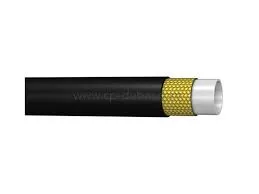Nov . 10, 2024 00:44 Back to list
Durable Rubber Hydraulic Hoses for Water Transport and Industrial Applications
Understanding Rubber Water Hydraulic Hoses Applications and Benefits
Rubber water hydraulic hoses play an essential role in various industries, providing reliable and efficient solutions for fluid transportation. Designed to handle high-pressure applications, these hoses are utilized in construction, agriculture, manufacturing, and many other fields, making them a staple in modern engineering.
Composition and Structure
Rubber water hydraulic hoses are typically constructed from high-quality synthetic rubber, reinforced with layers of textile or steel wire to improve their strength and durability. The outer layer is designed to protect against abrasion, weather, and environmental factors, while the inner layer is specifically engineered to handle high pressures and prevent leakage. This robust construction ensures the hose maintains its shape and functionality under various operating conditions.
Versatility and Applications
One of the primary advantages of rubber water hydraulic hoses is their versatility. They can transport a wide range of fluids, including water, oil, and other hydraulic fluids, making them ideal for applications in multiple sectors. In the construction industry, for example, hydraulic hoses are critical for powering machinery such as excavators and bulldozers. These hoses facilitate the transfer of hydraulic fluid, allowing equipment to perform efficiently and safely.
In agriculture, rubber hydraulic hoses are used extensively for irrigation systems. They can withstand the pressures associated with pumping water over long distances, ensuring crops receive adequate hydration. Additionally, they are employed in spraying pesticides and fertilizers, helping farmers enhance crop yield while ensuring that they operate effectively under varying temperatures and weather conditions.
rubber water hydraulic hose

In manufacturing, rubber hydraulic hoses are pivotal in moving materials and facilitating processes. They can be found in assembly lines, where they transport various fluids needed for manufacturing components. Furthermore, they are crucial in HVAC systems, where they assist in fluid movement for heating and cooling mechanisms.
Advantages of Rubber Water Hydraulic Hoses
The benefits of using rubber water hydraulic hoses are numerous. First and foremost, their flexibility allows for easy maneuvering and installation in tight spaces, which is often a requirement in industrial and construction environments. This flexibility, combined with their ability to withstand high temperatures and pressures, means they can effectively handle the demands of rigorous industrial applications.
Additionally, rubber hydraulic hoses offer excellent resistance to wear and tear. Their construction protects them from abrasions and impacts, extending their service life and reducing the frequency of replacements. This reliability translates to lower maintenance costs and increased productivity.
Another significant advantage is the environmental resilience of rubber hoses. Many rubber materials used in hydraulic hoses can withstand exposure to UV rays, ozone, and various chemicals, making them suitable for outdoor and industrial settings. This durability ensures performance consistency even in challenging conditions.
Conclusion
In conclusion, rubber water hydraulic hoses serve as a backbone for many industries that rely on fluid transport. Their robust construction, versatility, and resilience make them indispensable in sectors such as construction, agriculture, and manufacturing. As technology continues to advance, the development of even more durable and efficient hydraulic hoses is expected, further enhancing their role in modern industrial practices. Whether powering heavy machinery, supporting agricultural irrigation, or facilitating manufacturing processes, rubber water hydraulic hoses are critical to operational success and efficiency. With ongoing innovations and improved materials, their future looks promising as industries continue to evolve.
-
Best Four Steel Wire Spiral Hose Hydraulic R12 – Durable High-Pressure Hose Manufacturer
NewsJul.08,2025
-
High-Quality 1/4 Hydraulic Hose – Soft, Flexible & Durable Rubber Hoses for Industrial Use
NewsJul.08,2025
-
1 1 2 Inch Hydraulic Flexible Hose - Durable, Reliable, High-Pressure Solutions
NewsJul.07,2025
-
High-Quality 1 2 Rubber Hose - Durable, Flexible Hydraulic Solutions
NewsJul.07,2025
-
Discover SAE Hydraulic Hose Types - High Quality & Durable Hoses from Leading Factory Supplier
NewsJul.06,2025
-
High Pressure Wire Hydraulic Rubber Hose Supplier Durable & Reliable 1SN Hose Solutions
NewsJul.06,2025
